- whatcost.co.uk
- Blog
- Waste Management Guide: 2026
The Importance of Waste Management

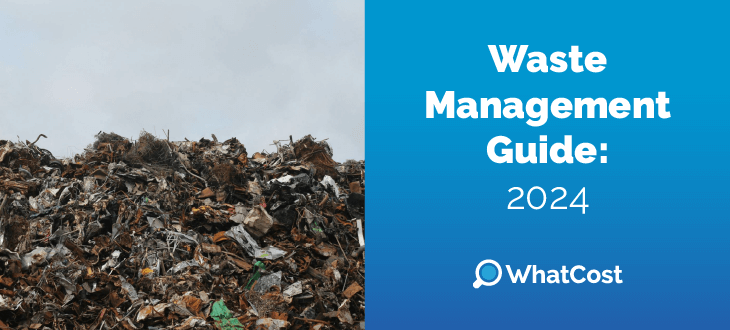
When living our lives, one thing we often take for granted is waste management. We’ll often throw things away without a second thought about what will become of that unwanted item. Waste management is crucial for a clean society, without it big settlements like cities would be rampant with rubbish and disease.
In this guide we’re going to look into; what waste management is, its different forms, key statistics, environmental benefits and impacts, and its future.
What is Waste Management?
Waste management is the action taken to dispose of and manage waste. This process starts at collection, then is transported to be either disposed or recycled. This includes all different types of waste including; industrial, household and hazardous which can come in the form of solids, liquids and gases.
The overall aim of waste management is to drastically reduce the amount of rubbish that goes to landfills. There are many different types of waste management to ensure that this is done.
Types of Waste Management
Landfill
A landfill site is an area of land used to dump waste, it acts as a storage facility for rubbish that cannot be recycled or disposed of. Rubbish is either dumped on top of unused land or is used to fill holes dug underneath the ground. As of January 2024, there are 540 total landfill sites in the UK. The Environmental Journal states that 45.4m tonnes of waste ends up in landfills each year.
When a landfill site is full and cannot take any more rubbish, a ‘cap’ is placed on top of it which is usually made up of a thick layer of compacted clay. This will stop rain from getting to the waste and also prevent harmful gases and liquids from escaping.
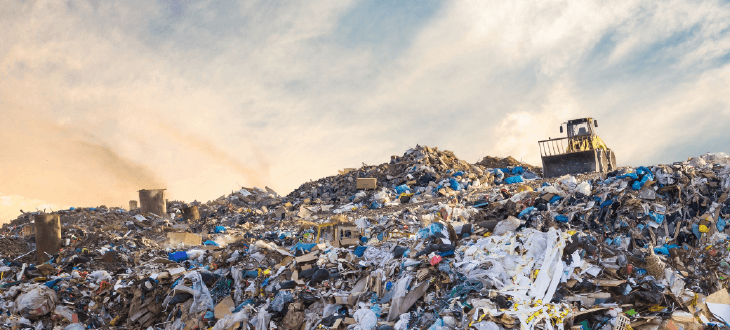
Incineration
Incineration is another way of disposing of waste, this is when rubbish is burned at high temperatures. Its aim is to reduce the volume and weight of the waste, and in most cases does that by 95%. This saves room on landfill sites that otherwise would be rammed full of materials that could be burnt. Some incinerators generate electricity as a by-product of burning rubbish, which then can be used in other areas.
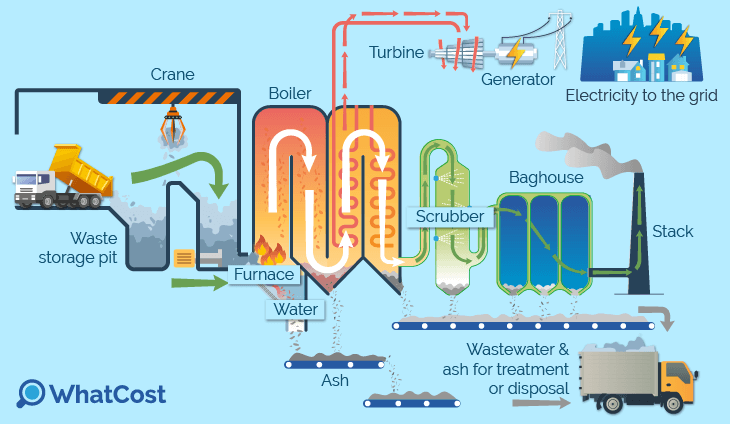
Composting
Composting is where waste is broken down by microorganisms such as bacteria over time. It converts organic materials into nutrient-rich soil which can be used for growing food. Organic materials include; human waste, animal waste, garden waste and food waste. It is a type of waste management that can be done in people’s gardens at home, to save money on fertiliser and be more eco-friendly.
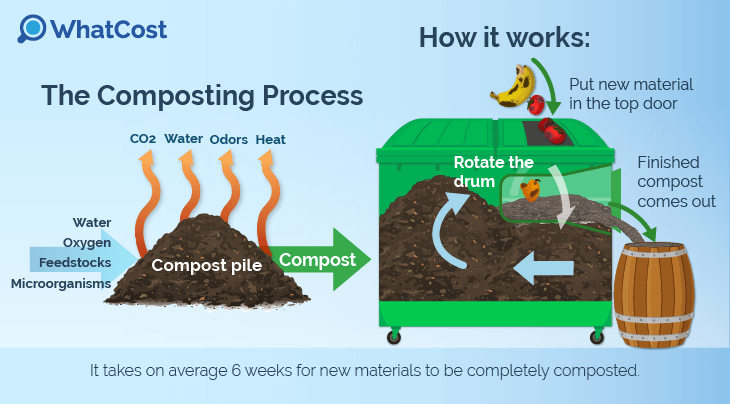
Recycling
The Cambridge Dictionary describes recycling as the process of sorting and collecting rubbish in order to treat it and produce useful materials that can be used again. Recycling is something that has been encouraged heavily in the UK over the past few decades, with almost all households having a recycling bin. Companies are also more recyclable-minded, with them continually finding new ways to eliminate the use of single-use plastics. An example of this is the use of bags for life in supermarkets and the implementation of paper straws at fast food restaurants.
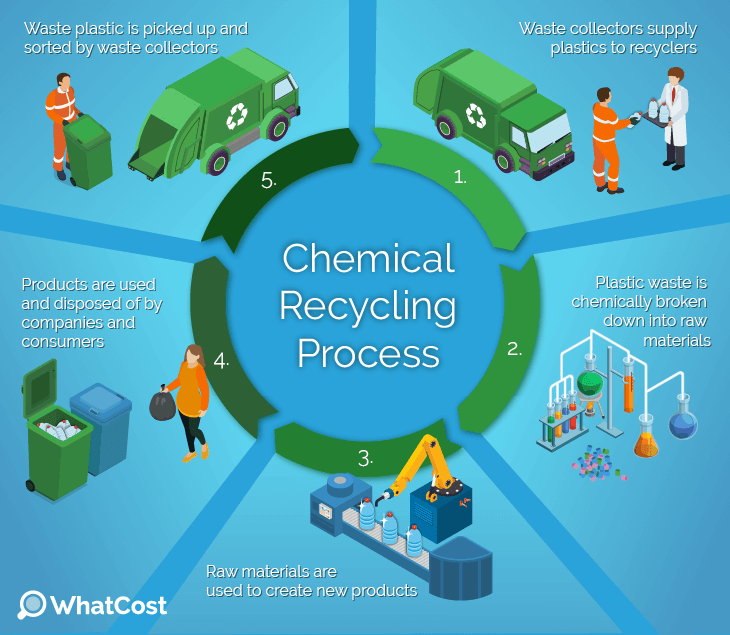
Key Waste Management Statistics
- In 2021, 27.1 million tonnes of waste was produced by UK households, this is almost one tonne per household.
- The recycling rate in households in England in 2022 was 43.4%, down 0.7% in 2021.
- From 2020 to 2021, the total landfill biodegradable waste increased from 6.1 million to 6.8 million tonnes. This was an increase of 700,000 tonnes in just one year.
- 63.2% of UK packaging waste was recycled in 2021.
- The value of the recycling industry is estimated to be around £24.9 billion in the UK.
- Between 2022 and 2023, 49.1% of total waste was incinerated. The high rate of incineration is constraining the UK’s ability to meet recycling targets.
- According to Statistica, the largest source of waste generation in the United Kingdom is the construction, demolition and excavation segment, which amounts to 62% (138 million metric tonnes) of the total waste.
- In 2020, 6% of the total UK CO2 emissions came from waste management.
Environmental Benefits
Produces electricity
During the incineration process, electricity is produced as a by-product. This can be used to power local people’s homes and benefit the community. It is also more eco-friendly as less fossil fuels will be required for power.
Composting is good for the environment
Composting is the most environmentally friendly form of waste management, it enriches soil to the point it’s filled with good nutrients making an effective fertiliser. In addition, composting helps to improve carbon sequestration in the soil and prevent methane emissions which aids towards preventing global warming.
Allows for clean cities, towns and villages
Without waste management, our towns, cities and villages would become overrun with waste. There would be nowhere to take our rubbish once we are done with it, and this would lead to an increase in pests like rats, mice and insects. Rats particularly are common carriers of harmful diseases like; Hantavirus, Salmonella, Tularemi and Leptospirosis. All of which can cause serious damage to your physical health, if not even kill you. Good waste management allows areas to remain a positive, clean and hygienic place to live where people don’t have to worry about issues with discarded rubbish.
Saves money
Recycling particularly saves a lot of money, materials that would have otherwise been disposed of can have new life as something positive. It means we don't have to buy new materials to be either grown, mined or created and instead use what we already have available. Regular recycling also extends the life of landfill sites, meaning that fewer new ones will be required. Landfill sites cost a lot of money to build.
Environmental Impacts
Produces harmful emissions
Landfills and incineration of waste both produce harmful emissions that are bad for the environment. Incineration requires the burning of thousands of tonnes of waste, this burning creates thick black smoke which rises into the atmosphere. On the other hand, landfills are equally a problem as over time the waste can turn into harmful gases which escape and rise into the sky.
Destroys local wildlife
For landfills to be built, a lot of land is required. Landfills will often be found outside of cities and towns and will require the destruction of local wildlife. Animals will have their homes there or will frequent the area that has turned into a landfill site, these animals will be killed or forced somewhere else.
Eyesore
When it comes to waste management, the people living around landfills are often forgotten. They have to deal with the eyesore that a landfill site comes with, instead of fields or clear hills the view is of waste spread across large areas of land. Smell is another factor, landfills and incinerators produce nasty odours which local people have to tolerate. This can make household tasks like washing clothes or sheets very difficult, as the outside smell can get on the washing. These waste management sites can really negatively impact someone's quality of life.
Can infect water systems
Waste left in landfill sites can be liquid or turn into liquid after a period of time. This can flow into local water systems polluting lakes, rivers, streams and the coastal water. It might become dangerous for nearby people to swim in these areas and will have an even worse effect on the UK’s waterlife.
Future of Waste Management
Waste-to-energy
As mentioned earlier, incineration can produce electricity as a by-product. Advancements are being made to make this more efficient so that more power can be produced from this process. Not only incineration but gases created in landfills can also be recovered and converted into usable energy. This innovation, if further developed, would make waste management beneficial for the people of this country. It would reduce reliance on fossil fuels, putting Britain a step closer to its net zero target.
Smart Waste Bins
Smart waste bins are bins that can monitor their levels in real-time. The bin sends alerts when it is about to become full or is completely full which lets people know that it needs clearing. This would allow councils to optimise their waste collection by making sure they visit the most required areas first. It could also save them money if a certain area doesn’t require regular visits.

Josh Houston is a writer at WhatCost whose passionate about the world of renewable energy, energy saving solutions and home improvements. He specialises in providing useful tips that our readers can adopt for their own needs. His skills involve translating complex topics to something more understandable.
